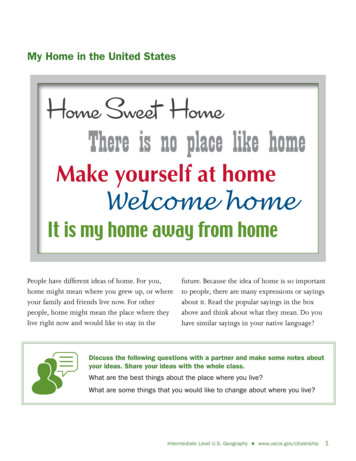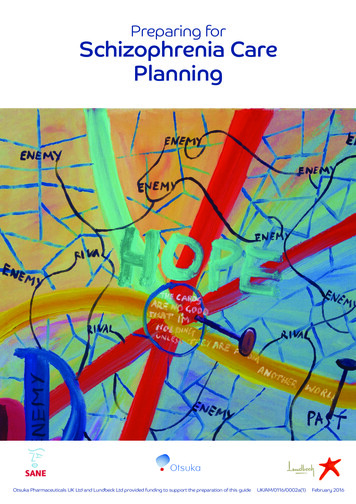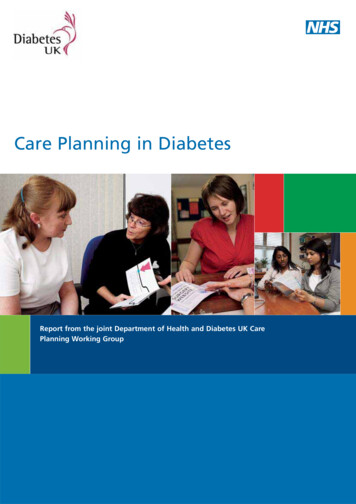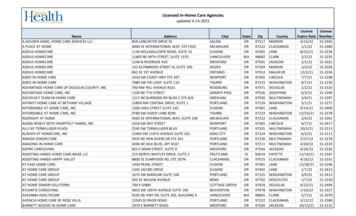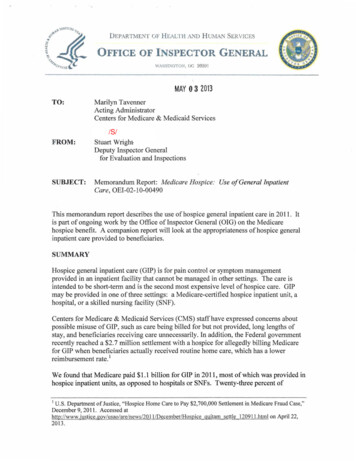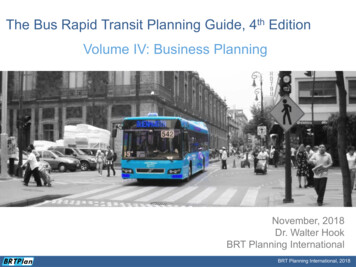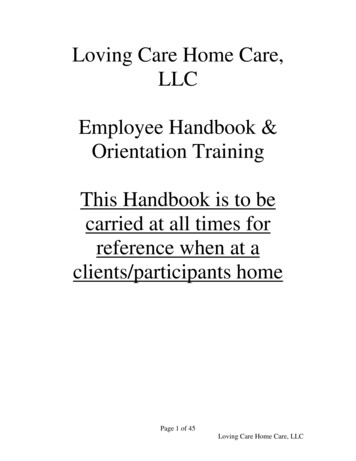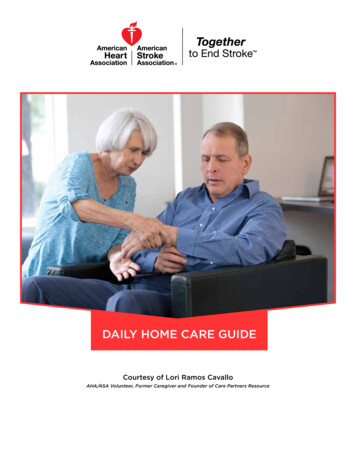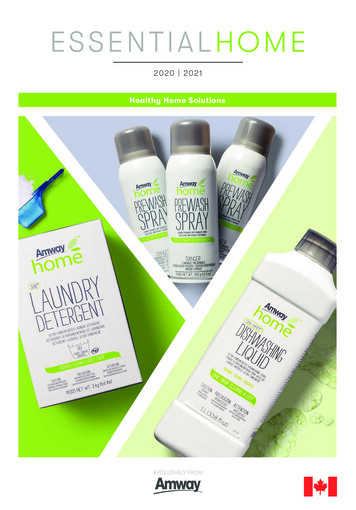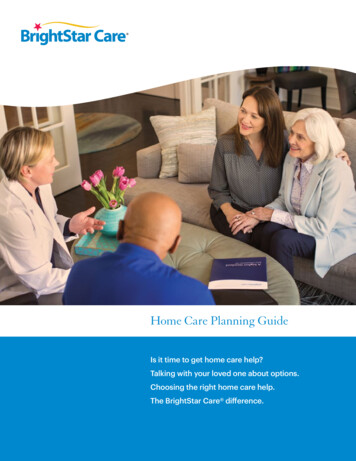
Transcription
Home Care Planning GuideIs it time to get home care help?Talking with your loved one about options.Choosing the right home care help.The BrightStar Care difference.
Is it time to get home care help?When a person you care about needs extra care.Who is BrightStar Care ?How to go about getting home care can be confusing andoverwhelming for families.BrightStar Care has been workingwith families since 2002 to providedependable, supportive home carefor people of all ages. Our storybegins with our founder’s ownfrustration of not knowing whereto turn to give an aging relativethe quality of care and qualityof life she deserved. Today weare over 325 locations strong,all independently owned andoperated, with RN oversight forevery client. You can read moreabout us on page 14.The difficulty often begins with simply deciding if now is thetime to hire home care help, especially if it’s for a parent,grandparent or spouse who once took care of you. You wantto make the right choices for their well-being and your peaceof mind, but you also want to honor their pride and dignity.How to coordinate care with their current physicians or otherhealth care providers and how to pay for it are things you mayhave to consider, too.We created this Home Care Planning Guide to help you findthe right solution for making sure your loved one has the carethey deserve, no matter which direction you go.It all starts with asking the right questions.
IS IT TIME TO GET HOME CARE HELP?Questions to help you determine their need for extra care.Living in their own home is what most people want as they age and, in many cases, it’s the mostcost-effective solution. To help determine if it’s time to find in-home care for your mom, dad or otherloved one, think about what a typical day is like for them.YNIf the phone rings, do they hear it and answer it in a safe and timely manner?Can they hear the other person on the phone and have a conversation?Do they store food safely and throw it away when it’s no longer safe to eat?Do they keep their kitchen, living room, bedroom and bathroom clean?Do they clean up after meals? Wash dishes, put them away, wipe down surfaces?Do they see to it that the lawn is mowed, yard is tended to and sidewalk anddriveway are shoveled, if needed?Are they doing their own laundry? Carrying it safely into the laundry room,transferring it from washer and dryer, folding it and putting it away?Do they drive safely and with confidence? To the bank, store, place of worshipor to friends’ and relatives’ homes?Do they shop for their own groceries, selecting and paying for healthy foods andtransferring the groceries from store and car to kitchen?Do they stay on top of their finances such as paying mortgage or rent, utilitiesand other bills?Are they attending social and family activities they enjoy, like book club, bridgeclub, going to restaurants, religious services, reunions, birthday parties, etc.?Do they talk and socialize with their friends, neighbors or relatives regularly?Are they able to do the activities they enjoy on their own, such as crafts, lightgardening, puzzles, etc.?Are they able to take care of any pets they have, taking them for walks or cleaninglitter boxes and cages?If you answered NO to any of the above questions, then your loved one might benefit from companioncare. The more “Nos” you check, the more likely they need support.For more information, please call 844-4-BRIGHTSTAR or visit brightstarcare.com. 3
IS IT TIME TO GET HOME CARE HELP?YNWhen your loved one wakes up, can they get out of bed easily?Can they walk from the bedroom or bathroom to the kitchen without risk of falling?Can they get into the shower or bath safely?Do they bathe regularly and completely?Do they groom themselves and maintain good overall hygiene? Brush teeth, shave,comb hair, trim nails, etc.?Do they dress in clean clothes and put dirty clothes in the laundry?Do they prepare and eat regular nutritious meals, following any specialdietary requirements?Do they take the right prescription dosages at the right time?Can they manage any illness needs (e.g., testing blood sugar) safely and effectively?If they require medical equipment (e.g., oxygen), can they manage it on their own?Do they make it to their medical appointments and understand their plan of care?Do they get at least 30 minutes of exercise that’s safe for them every day?If you answered NO to any of the above questions, then your loved one might benefit from skilled* and/orpersonal care. The more “Nos” you check, the more likely they need support.YNCan they remember events from the previous day or week? Are they able toremember names of people close to them?Do they always remember to turn off burners and running water?Do they continue to come and go from their home without confusion?Are you able to go through your day without worrying about their safety?If you answered NO to any of the above questions, then your loved one might benefit from care providedby nurses or caregivers who are experienced in caring for those with memory loss.*Skilled/medical service availability varies by state. Call 844-4-BRIGHTSTAR for a full list of services or to schedule a free in-home assessment.BrightStar Care Home Care Planning Guide 4
IS IT TIME TO GET HOME CARE HELP?Talk with family and others.Understanding a loved one’s need for care should alsocome through discussion with family members and othersinvolved with their care. Part of that discussion shouldinclude whether or not family members or others areavailable, willing and able to provide the level of carethat’s needed.As you explore home care options, it’s also important toconsult with the professionals in your loved one’s life suchas their: Physician or specialistNurse practitionerPharmacistFinancial planner or accountantLong-term care insurance providerLawyerSocial worker or mental health professionalReligious leaderNext steps.Once you’ve completed the exercise and discussions,you should be better prepared to talk with your loved oneabout the right care options that will help them live athome safely and happily.20hrsThe average amount of time perweek family members spend caringfor their mom, dad or spouse*.What’s the differencebetween companion careand personal care?Companion and personal care aregenerally considered non-skilledor non-medical care that doesnot require a nurse’s specializedexpertise, training and skills. Companion care accommodatessafety and well-being needs suchas help around the home ortransportation to and from places Personal care is hands-on care,such as help with bathing ormobility, typically performedby a Certified Nursing Assistantor Home Health AideFor more examples, see page 11of this guide.*www.nextstepincare.org
Talking about home care help.If you feel your mom, dad or other loved one could benefit from home care, the next stepis to talk with them. To help make the conversation easier for both of you, we’ve prepareda list of dos and don’ts.DoDon’tBegin having conversations about their healthsooner rather than later.Don’t put it off. If they have any memory lossor risk of falling, delaying the conversationmay make it more difficult for them.Prepare questions to ask and points you wantto get across in advance.Don’t tackle the conversation on the spur of themoment, but don’t treat it like a business meetingeither (i.e., referring often to your notes).Have the conversation in person. Sit facingthem, and look them in the eyes.Don’t try to do this over the phone, text, videochat or email and don’t look at your phoneduring the discussion.Consider approaching the conversation bybringing up people they know in similarsituations and the solutions their families found.Don’t forget to ask questions, e.g., how wouldyou feel if that happened to you? Do you thinkyou could benefit from something like that?Ask questions. What do they perceive as themost difficult things about their days? Whatdo they still enjoy?Don’t answer questions for them. Give themtime to reflect.Listen with your full attention.Don’t interrupt or talk over them. Help themfeel listened to by beginning a sentence with,“I heard you say ” and then repeat whatthey said.If things aren’t going well, you can suggestthat they “just try it for a week.” Or offer to talkagain a day or so later.Don’t be inflexible or impatient. Understand thatthey don’t want to lose control of making theirown decisions in life.BrightStar Care Home Care Planning Guide 6
Strategies from AARP .Your mom, dad or other loved one may view accepting helpas giving up their privacy or control over their own lives. Formany, it’s a sign of weakness and a mixed bag of emotions,including fear, vulnerability, anger and guilt about being aburden. Having empathy can help you better understandand find a solution they can agree to.AARP offers a few strategies to try:Empowerment Show that you’re on their team and support their desireto live independently Suggest that accepting some help would allow themto remain self-sufficient longerAdditional ResourcesFamily Caregiver Alliance –National Center on Caregivingwww.caregiver.orgAARP – CaregivingResource Centerwww.aarp.org/caregivingNext Step in Carewww.nextstepincare.orgGenworth Cost of Care Studywww.genworth.comEnablers of GrowthOr as an app in iTunes:“Genworth Cost of Care” Point out that the experience of caring for an aging parentgives an adult child the opportunity to grow personallyand spirituallyBrightStar Care Resourceswww.brightstarcare.com/resources Explain how much it would mean to you if they wouldaccept your help — and the help of a caregiver that yourecommend for themRole Model for Aging Remind them that receiving care graciously is the sameas growing old gracefully Point out that you still need them, this time to be anexample of how to handle the physical and cognitivedecline that is part of being human and living long40millionNumber of Americans who are nowage 65 . By 2050, the 85 agegroup will reach 19 million*.*www.ioaging.org/aging-in-america
Choosing home care help.If you need home care help, or have decided with a loved one that it’s time for them to receivehelp, the next big question is whether to hire someone on your own or go through an agency.
CHOOSING HOME CARE HELPHiring someone on your own.Many people find satisfactory results informally by hiring a relative, neighbor or friend forhome care. This typically works best when little skill or training is required and your loved oneis comfortable with someone they know and trust.Sometimes your loved one might worry that a family or friend caring for them will judge themor see them as needy. In those cases, someone they are not already connected with might bea better choice. Check online listing services and on bulletin boards in your community.Pros of Hiring on Your OwnCons of Hiring on Your Own Typically less expensive than an agency You’re the boss, you choose the caregiver Flexibility in the type of care they perform You’re responsible for background check,hiring, firing, taxes, etc. If they can’t come as scheduled, it’s up toyou to find a replacement You may need to buy additional liabilitycoverage in case of an on-the-job accidentHiring someone through an agency.Many agencies offer a range in levels of care so if needs change, the agency may have someoneon staff who can safely care for your loved one.Pros of Hiring Through an AgencyCons of Hiring Through an Agency Screening, hiring/firing, payroll, insuranceand taxes are handled If hours you request are inconsistent, youmay not get the same caregiver each time Can accommodate unpredictable schedulesbecause they have multiple caregiverson staff May experience staff turnover May charge more for some tasks Usually covered by long-term careSource: Family Caregiver Alliance, www.caregiver.orgFor more information, please call 844-4-BRIGHTSTAR or visit brightstarcare.com. 9
CHOOSING HOME CARE HELPQuestions to ask before choosing an agency.To find the best home care agency for your loved one, you may want to interview more than oneagency. The chart below can help you ask the right questions and keep track of the answers.Agency 2Are you licensed for skilled (medical) home care? Areyou licensed for personal care or companion care?Yes*Do you have a nurse who evaluates health and wellnessand creates a plan of care?YesDoes a nurse follow up with supervisory visits to ensurethat the plan is being carried out?YesAre your caregivers experienced, trained andcompetency tested?YesAre all nurses and caregivers drug-screened, backgroundchecked, licensed, insured and bonded?YesDo you manage the pay of all caregivers, including taxes?YesDo you assign a caregiver based on personalitiesand compatibility?YesDo you attract and keep the most qualified caregivers byoffering continuing education and other incentives?YesDoes your agency have a system in place if there is aconflict of personalities?YesAre you insured for accidents in the home?YesCan you accommodate any length of visit, as short asone hour per day?YesCan you provide a caregiver trained in(condition or need your loved one has)?YesIs there someone on-call 24/7 — just in case?YesDo you follow national safety standards?YesWhat are your rates?Agency 3Call us!*Skilled/medical service availability varies by state. Call 844-4-BRIGHTSTAR for a full list of services or to schedule a free in-home assessment.BrightStar Care Home Care Planning Guide 10
CHOOSING HOME CARE HELPUnderstanding different types of care.Keep in mind that the type of care your loved one needs may change, so it’s a good idea to askagencies you’re interviewing about services you might need down the road. BrightStar Care trains staff to report changes in condition to our Registered Nurse supervising the care.Below is a partial list of services that BrightStar Care can provide. Call us to learn more.Companion CarePersonal Care Conversation and activitiesbased on their interest Help with mobility in andoutside of the home Transportation to and fromappointments, activitiesand events Bathing Dementia support whenthey shouldn’t be alone Dressing and grooming Feeding Oral and personal hygiene Medication reminders Help with incontinence Laundry Outpatient pre- andpost-op assistance Light housekeeping Meal prep Home safety evaluation Help connecting withothers through letters,e-mail and social media Engagement in art or craftprojects, reading, gamesor puzzles Time off for family caregiverSkilled Care* Medication administration Wound care Blood draws and injections Central and peripheralintravenous drug therapy,such as chemotherapy Assistance withmedical equipmentincluding ventilators Administration andmaintenance of catheters PICC line dressing changes Total Parenteral Nutrition(TPN), G-tube orother feedings Epidural mediports Physical, occupational andspeech therapy Rehabilitation*Skilled/medical service availability varies by state. Call 844-4-BRIGHTSTAR for a full list of services or to schedule a free in-home assessment.For more information, please call 844-4-BRIGHTSTAR or visit brightstarcare.com. 11
Who will cover the cost of care?Home care can be more cost-effective than a nursing facility and is an appropriate use of the carerecipient’s income and assets. It’s the “rainy day” they’ve been saving for all these years.Below are some questions to help you prepare for a conversation with BrightStar Care or any other home care service provider. What income, savings and assets does my loved one have available?Did he or she or their spouse serve in the military?What health insurance do they have? What does it cover?Do they have long-term care insurance?Understanding the role of Medicare in home care.Medicare covers some in-home care, but the type of service and frequency may be limited. (Forexample, Medicare does not cover in-home care needs related to dementia.) If your loved one iscurrently receiving care from a Medicare home health agency, BrightStar Care will work with theMedicare agency to provide the supplemental or continued care needed.BrightStar Care Home Care Planning Guide 12
CHOOSING HOME CARE HELPFinding the right solution.Except for private pay, most payment sources for homecare services have eligibility requirements and limitations.Often the solution is a combination of these six sources.1. Private Pay or “Out of Pocket”Paying with personal funds helps cover services when youor your loved one’s care has reached the limits of serviceand support from sources such as Medicare or otherinsurance coverage.2. Private Health InsuranceThanks to partnerships with national and local insurancecompanies, BrightStar Care is sometimes in-network.Call us today for more information.3. Military BenefitsThere are some veterans’ benefits such as Veterans Aid &Attendance that might assist you with paying for home care.Call us today and we’ll help you determine if you qualify.4. MedicareMedicare home health agencies provide service basedon a doctor’s prescription, usually for a specific conditionand a set period of time. BrightStar Care does not acceptMedicare, but we’ll work with Medicare home healthagencies to provide supplemental or continued care.5. MedicaidEach state decides what services are provided under theirHome and Community Based Service (HCBS) waiverprogram. To qualify, your loved one must meet your state’seligibility requirements and have income and assets belowcertain guidelines. You can learn more at Medicaid.gov.6. Long-Term Care InsuranceLong-term care benefits usually pay for in-home assistancewith “activities of daily living,” such as bathing, dressing,incontinence care, transfers (from bed, chair, toilet, etc.),meal prep and more. If your loved one has long-terminsurance, BrightStar Care can help you process the claimand in some cases assist with billing.Staying open to differencesOne problem you might run intois your loved one may have acaregiver preference that isdifficult to meet. Remind themthat it’s often a caregiver’scharacter and skill that makethem wonderful. Being opento a caregiver from a differentbackground or ethnicity can leadto rewarding experiences.VIP customer servicefor those who’ve served.1-855-260-3274Toll-free support line for familymembers taking care of veterans.Licensed clinical social workerswill answer your questions anddirect you to a VA caregiversupport coordinator in your area.
Learn how BrightStar Caremakes the difference. At BrightStar Care, we’re all about delivering a higher standard of home care — one that peopleknow they can trust when they want quality care for their mom, dad or other loved one.The role of the Registered Nurse at BrightStar Care.A higher standard of care begins with having a Registered Nurse who: Oversees and verifies each plan of care based on your loved one’s needs Conducts supervisory visits to ensure caregivers are following the plan of care Ensures high quality standards are maintainedIn addition, all BrightStar Care locations have an RN, LPN or LVN who: Answers questions you may have about your loved one’s health and well-being Reviews care notes submitted by our caregivers to monitor progress, change in condition ormedication side effects Verifies the competency and credentials of caregivers and provides ongoing support and training Helps coordinate care with physicians or your Medicare home health agencyBrightStar Care Home Care Planning Guide 14
THE BRIGHTSTAR CARE DIFFERENCEWe search for and find a higher standard of caregiver.We hire caregivers who enjoy getting to know the people they are providing care for and arededicated to helping them have a better quality of life. Most of all, our caregivers take pridein upholding our promise of providing a higher standard of care every day.Our recruiting and rigorous screening practices help make sure your loved one’s caregiverhas the right mix of experience and training, can-do attitude and heartfelt compassion. In-depth, in-person interviewsCriminal background check and drug screeningVerification of license/certificateReference checks via phone or emailHealth screenings including TBCurrent CPR certificationCompetency verification by our Registered NurseThe Joint Commission: Raising the bar on safety and care.The Joint Commission is a widely recognized organization that accredits the nation’s besthospitals and other major health care systems.When you see The Joint Commission Gold Seal, you know that the BrightStar Care location hasundergone a detailed on-site review by a Joint Commission expert who confirms that they followrigorous requirements for quality, safety and care.Newer locations without the gold seal are in the process of pursuing the same accreditation bycarefully following The Joint Commission National Patient Safety Goals . In addition, BrightStarCare is the only national home care brand that, based on the performance of local offices,consistently earns the Enterprise Champion for Quality award from The Joint Commission.To ensure quality care andpatient safety, each BrightStarCare location integratesThe Joint Commission standardsinto its training materials.
We’re ready to help!Someone at our BrightStar Care location is available to help you 24 hours a day, 7 days a week.A BrightStar Care nurse and care team member will come to your home to get to know you andyour loved one, discuss their care needs and answer any questions. The nurse will conduct ahealth and wellness evaluation and begin building a personalized plan of care based on yourinput and your loved one’s needs.Call to schedule a free in-home assessment with a BrightStar Care nurse today.Thank you for your interest in BrightStar Care.We hope this guide helps you and your family think aboutways home care can help your loved one live safely,healthily and happily. We appreciate the opportunity toserve you and others in the community who are lookingfor a higher standard of care.All BrightStar Care agencies are independently ownedand 014cps BrightStar Care 06/20
How to coordinate care with their current physicians or other health care providers and how to pay for it are things you may have to consider, too. We created this Home Care Planning Guide to help you find the right solution for making sure your loved one has the care
